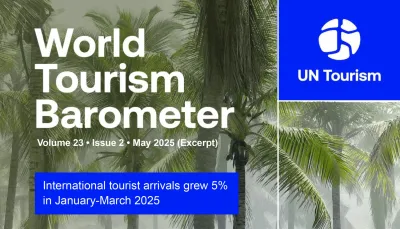AI's Transformative Role in Travel and Tourism: A Focus on Responsible Implementation

New York, NY – The World Travel & Tourism Council (WTTC), in collaboration with Microsoft, has recently released pivotal reports highlighting the transformative potential of Artificial Intelligence (AI) in the travel and tourism sector. These reports emphasize the critical need for responsible AI implementation to enhance customer experiences, drive sustainability, and foster innovation while mitigating associated risks.
Overview of AI's Impact and Potential: The WTTC's latest publications, "Responsible Artificial Intelligence (AI): Overview of AI Risks, Safety & Governance" and "Artificial Intelligence (AI): Global Strategies, Policies & Regulations," were unveiled during the UN General Assembly in New York. They underscore AI's ability to revolutionize travel and tourism, from optimizing airport traffic and reducing hotel food waste to personalizing customer experiences.
Responsible AI Adoption: The reports delve into various facets of AI adoption, stressing the importance of transparency, accountability, and fairness. They highlight several strategic risks, including potential biases in AI systems, job displacement, disinformation, safety, and security concerns. The WTTC advocates for robust testing, human oversight, and international standards to ensure AI aligns with human values and ethical principles.
Julia Simpson, WTTC President & CEO, stated, "In a rapidly evolving landscape, AI emerges as a catalyst for positive change. The insights provided in these reports demonstrate that AI is not just a technological advancement; it is a strategic tool that can personalize customer experiences, drive sustainable improvements, and shape the future of Travel & Tourism."
Real-World Applications: AI is already delivering significant benefits in the travel sector. For instance, major hotel groups like Iberostar are using AI to monitor and reduce food waste, achieving a 27% cost saving and preventing thousands of kilos of unwanted food from going to landfill. Julie Shainock, Managing Director for Microsoft's Travel, Transport, & Logistics Industry, highlighted AI's role in enhancing both customer and employee experiences while improving operational efficiency.
Global AI Strategies and Regulations: The second report, "Artificial Intelligence (AI): Global Strategies, Policies & Regulations," offers a comprehensive overview of the AI landscape across key countries and international organizations. It illustrates how policymakers are navigating AI regulations to foster innovation while ensuring ethical and responsible use.
The reports call for travel and tourism businesses to prioritize AI as a strategic investment, emphasizing the need to overcome barriers such as the shortage of AI-skilled workforce in the sector. The WTTC remains committed to promoting safe, ethical, and inclusive AI innovation.
Challenges and Future Directions: Despite AI's promising potential, the sector faces challenges like ensuring data privacy, addressing algorithmic biases, and maintaining human oversight. The reports suggest that businesses adopt responsible AI principles to manage risks and align AI systems with organizational values. They also stress the importance of international cooperation to establish a global standard for AI governance.
Conclusion: The WTTC's initiative highlights the transformative power of AI in travel and tourism, advocating for a future where AI drives sustainable and ethical advancements. By prioritizing responsible AI practices, the industry can harness AI's full potential to enhance customer experiences and operational efficiency while addressing critical risks and ethical considerations.



